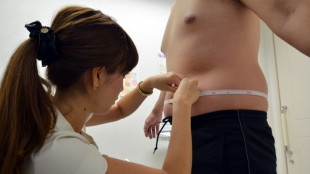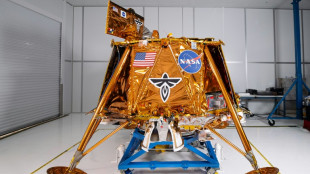
-
 Mitchell leads Cavs over Pacers, Thunder beat 76ers
Mitchell leads Cavs over Pacers, Thunder beat 76ers
-
S. Korea's Yoon: from rising star to historic arrest

-
 Ominous Alcaraz sweeps into Australian Open third round
Ominous Alcaraz sweeps into Australian Open third round
-
'Queen Wen' deposed in huge shock at Australian Open

-
 Vigilante fire clean-up launched by local Los Angeles contractor
Vigilante fire clean-up launched by local Los Angeles contractor
-
Zheng dumped out in huge shock as shaky Sabalenka battles through

-
 Asian equities mixed as US inflation, China data loom
Asian equities mixed as US inflation, China data loom
-
'Queen Wen' Zheng deposed in huge shock at Australian Open

-
 Renewed US trade war threatens China's 'lifeline'
Renewed US trade war threatens China's 'lifeline'
-
China's economy seen slowing further in 2024: AFP survey

-
 Shaky Sabalenka overcomes serve struggles to stay alive in Melbourne
Shaky Sabalenka overcomes serve struggles to stay alive in Melbourne
-
South Korea's six weeks of political chaos

-
 Japan's tourism boom prices out business travellers
Japan's tourism boom prices out business travellers
-
What is the pink stuff coating fire-ravaged Los Angeles?

-
 Mediators make final push for Gaza truce deal
Mediators make final push for Gaza truce deal
-
Musk, Bezos, Zuckerberg to attend Trump inauguration: report

-
 Federal probe begins into deadly Los Angeles fires
Federal probe begins into deadly Los Angeles fires
-
'We may look easy-going, but...' Canadians veto Trump's merger plan

-
 Is obesity a disease? Sometimes but not always, experts decide
Is obesity a disease? Sometimes but not always, experts decide
-
Biden issues land protections after LA fires delay ceremony

-
 Cuba to free over 550 prisoners after removal from US terror list
Cuba to free over 550 prisoners after removal from US terror list
-
Williams, Vine vie for season-opening Tour Down Under crown

-
 Maresca 'concerned' as Chelsea winless run stretches to five games
Maresca 'concerned' as Chelsea winless run stretches to five games
-
'Outstanding' Liverpool deserved more than Forest draw: Slot

-
 Guardiola laments Man City decision-making in Brentford collapse
Guardiola laments Man City decision-making in Brentford collapse
-
Marseille dumped out of French Cup on penalties

-
 Liverpool frustrated by Forest, Man City blow late lead at Brentford
Liverpool frustrated by Forest, Man City blow late lead at Brentford
-
Djokovic, Sabalenka chase history as Australian Open hits round two

-
 Golf star Woods pledges support amid 'unimaginable loss' of LA fires
Golf star Woods pledges support amid 'unimaginable loss' of LA fires
-
Liverpool held by Forest, Man City blow late lead at Brentford

-
 Cuba to free 553 prisoners after removal from US terror list
Cuba to free 553 prisoners after removal from US terror list
-
Leverkusen win to go one point behind Bayern, Kiel down Dortmund

-
 Jota rescues leaders Liverpool in Forest draw
Jota rescues leaders Liverpool in Forest draw
-
Title chasers Atalanta held by Juve, Milan hand Conceicao maiden Serie A win

-
 Man City blow late lead at Brentford, Chelsea held by Bournemouth
Man City blow late lead at Brentford, Chelsea held by Bournemouth
-
Rast charges through on second run to win Flachau slalom

-
 Grimaldo scores as Leverkusen go one point behind Bayern, Dortmund lose
Grimaldo scores as Leverkusen go one point behind Bayern, Dortmund lose
-
Starbucks shift on non-paying visitors stirs debate in US

-
 Clashes as S. Korean investigators attempt to arrest President Yoon
Clashes as S. Korean investigators attempt to arrest President Yoon
-
US, Japanese lunar landers set to launch on single rocket

-
 Boeing 2024 plane deliveries tumble on labor, safety woes
Boeing 2024 plane deliveries tumble on labor, safety woes
-
US removes Cuba from state sponsors of terror list

-
 Argentine annual inflation nosedives, in boost for Milei
Argentine annual inflation nosedives, in boost for Milei
-
S. Korea investigators arrive in new attempt to arrest President Yoon

-
 Pressure builds on Dortmund boss Sahin after loss at Kiel
Pressure builds on Dortmund boss Sahin after loss at Kiel
-
Meta to lay off 3,600 employees in performance-based cuts

-
 Venezuela restricts diplomats from 'hostile' European countries
Venezuela restricts diplomats from 'hostile' European countries
-
Trump's Pentagon pick grilled by senators as cabinet hearings begin

-
 From ban to buyout: What next for TikTok in the US?
From ban to buyout: What next for TikTok in the US?
-
Lazio sack doc who performed far-right falconer's penis op: club owner


Spanish PM, Palestinian leader urge Mideast de-escalation
Spanish Prime Minister Pedro Sanchez on Thursday called for a de-escalation of the conflict in the Middle East, as Lebanon said 37 people had now been killed by booby-trapped hand-held devices.
"Today the risk of escalation is once more increasing in a dangerous way" in Lebanon, Sanchez told a news conference in Madrid after more than an hour of talks with visiting Palestinian president Mahmud Abbas.
"So we must again make a fresh appeal for restraint, for a de-escalation and for peaceful coexistence between countries, in the name of peace," he added.
Abbas also called for a new peace conference in the Spanish capital aimed at ending the Israeli-Palestinian conflict, modelled on the 1991 Madrid talks that led to the 1993 Oslo accords.
Urging a two-state solution, long a cornerstone of international attempts to end the decades-long conflict, Sanchez said a Palestinian nation "living side by side with the state of Israel" was the only way to "bring stability to the region".
Abbas's visit was his first to Spain since Madrid took the decision to recognise a Palestinian state on May 28. Ireland and Norway took the same decision in May.
"Why is this a good thing? Because Palestine exists and has the right to have its own state," Sanchez said.
Abbas expressed his thanks for Sanchez's support and Spain's recognition, urging "all states that have not yet recognised us to do so".
Neither Sanchez nor Abbas referred directly to the explosions of electronic devices that rocked Lebanon on Tuesday and Wednesday in the latest escalation of tensions.
Israel has not yet commented on the unprecedented wave of attacks in which Hezbollah operatives' pagers and walkie-talkies exploded in supermarkets, on streets and at funerals.
But Lebanon's Prime Minister Najib Mikati on Thursday called on the United Nations to intervene in what he called Israel's "technological war" against it.
Lebanon's Health Minister Firass Abiad said Thursday 37 people had been killed and more than 3,500 wounded in the explosions of the devices over the last two days.
- Palestinian state recognition -
Even before that stunning act of apparent sabotage, tensions were running high in the Middle East, in large part due to the war between Israel and Palestinian militant group Hamas in the Gaza Strip.
Since the war began, Sanchez has positioned himself as a champion of the Palestinian cause within the European Union.
His socialist government has increasingly taken highly critical positions towards Israel's conduct of its campaign against Hamas, rival to Abbas's own Fatah party which controls the Palestinian Authority in the occupied West Bank.
"The international community and Europe cannot remain impassive in the face of the suffering of thousands of innocents, largely women and children," he added.
Israel's military offensive has killed at least 41,272 people in Gaza, a majority of them civilians, according to data provided by the Hamas-run territory's health ministry. The UN has acknowledged these figures as reliable.
Hamas's unprecedented October 7 attack which sparked the war resulted in the deaths of 1,205 people on the Israeli side, mostly civilians, according to an AFP tally based on official Israeli figures that include hostages killed in captivity.
Out of 251 hostages seized by militants, 97 are still held in Gaza, including 33 the Israeli military says are dead.
M.Ouellet--BTB
